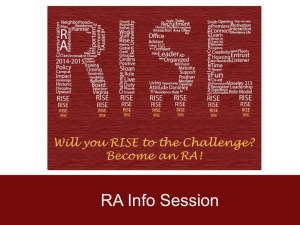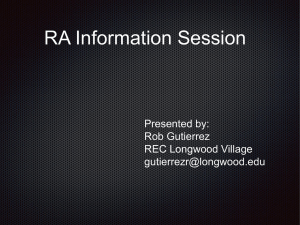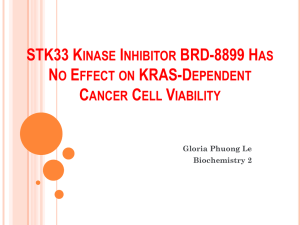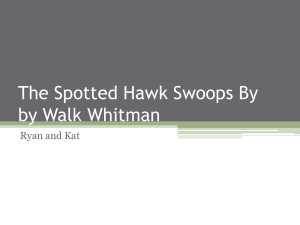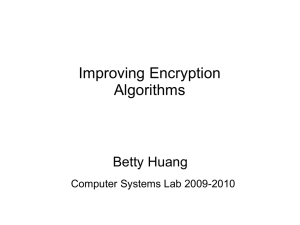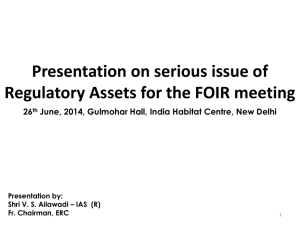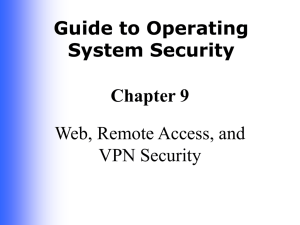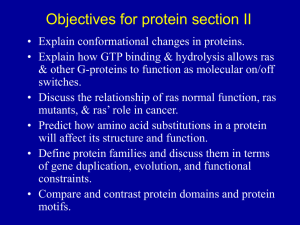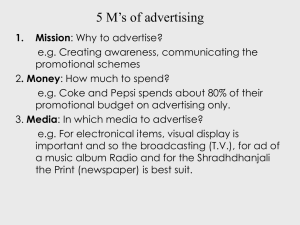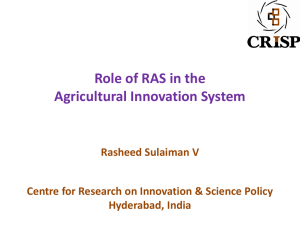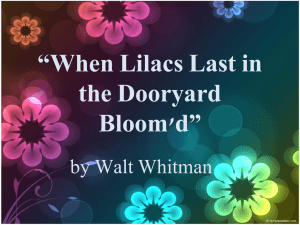RA learning outcomes: A Year in the making
advertisement
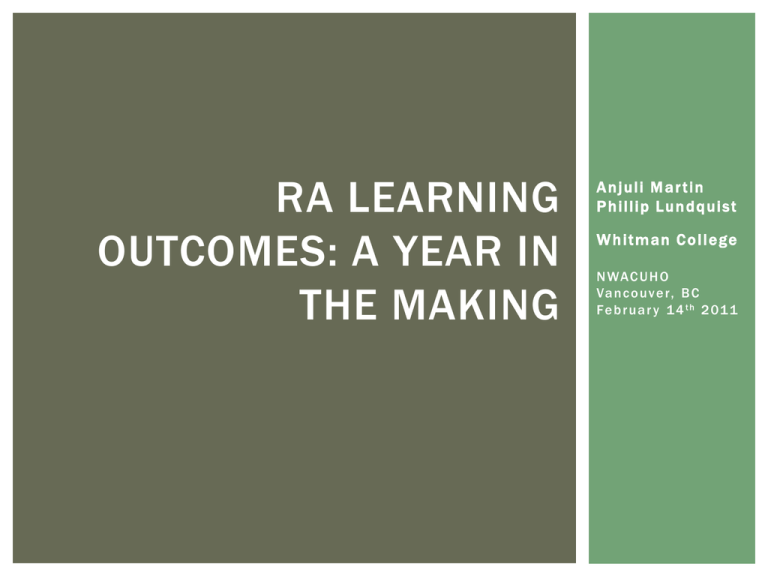
RA LEARNING OUTCOMES: A YEAR IN THE MAKING A n juli M a r t in P h illip Lu n dq uist W h it man C o l lege N WAC U H O Va n c o u v e r, B C Fe b r u a r y 14 t h 2 01 1 PRESENTATION OUTLINE Set context Relevant development theory Development of RA learning outcomes Practical use of these learning outcomes Review of year 1 Discussion Conclusion GOALS Provide a model for developing learning outcomes and their assessment Share ways in which we are improving the process after a year of use Start a dialogue amongst various institutions on dif ferent perspectives and techniques regarding learning outcomes RESIDENCE LIFE AT WHITMAN Whitman College is a private liberal arts college in Walla Walla, Washington 1450 student population, 57% female, 43% male Between 800 and 850 students live in campus residence halls as part of a 2 year on-campus living requirement 2 all-first year halls, 3 mixed year halls, 4 all -upperclass halls, and an Interest House Community of 11 themed houses 7 bachelor level Resident Directors 37 Resident Assistants, based on the calendar year 2 week training session in January, 1 week training in August Sophomore/junior and junior/senior timeframe MISSION STATEMENT Whitman College is committed to providing an excellent, well-rounded liberal arts and sciences undergraduate education. It is an independent, nonsectarian, and residential college. Whitman of fers an ideal setting for rigorous learning and scholarship and encourages creativity, character, and responsibility. Through the study of humanities, arts, and social and natural sciences, Whitman’s students develop capacities to analyze, interpret, criticize, communicate, and engage. A concentration on basic disciplines, in combination with a supportive residential life program that encourages personal and social development, is intended to foster intellectual vitality, confidence, leadership, and the flexibility to succeed in a changing technological, multicultural world. LEARNING OUTCOMES AT WHITMAN Learning Reconsidered (ACPA/NASPA , 2004) was the impetus for conversation of learning outcomes in Student Affairs in 2005 In fall of 2007, as part of accreditation process, it was recommended to do an outcome based assessment, and to show how it improves the program Various Student Affairs departments on campus with learning outcomes: Student Activities Reid Campus Center Associated Students of Whitman College (ASWC) Whitman Events Board (WEB) Outdoor Program Post Office Quality of Life and Learning – beginning in 1996, amended in 2008 to add student learning outcomes LEARNING OUTCOMES AT WHITMAN Work on learning outcomes in Residence Life began in 2006 Learning in Residence Halls was developed in 2007 Identity Formation, Emotional and Cognitive Learning, Behavioral Learning, and Meaning Making Processes are the framework for learning The 7 broad student learning outcomes from Learning Reconsidered were used to develop the outcomes we hope our residents gain from living in residence halls Cognitive Complexity; Knowledge Acquisition, Integration, and Application; Humanitarianism; Civic Engagement; Interpersonal and Intrapersonal Competence; Practical Competence; and Persistence and Academic Achievement Results from The Quality of Life and Learning survey are used to help assess these outcomes Having developed the outcomes on a macro level for students within the Residence Life program, the next step was the micro level of student staff within the program - RAs RELEVANT DEVELOPMENT THEORY Learning Reconsidered (ACPA/ NASPA, 2004) “The new concept of learning recognizes the essential integration of personal development with learning; it reflects the diverse ways through which students may engage with the tasks and content of learning. Student learning produces both educational and developmental outcomes…” (p.5) Learning Reconsidered 2 (ACPA, ACUHO-I, ACUI, NACA, NACADA, NASPA, NIRSA, 2006) “[Students] acquire knowledge and integrate it with their experience in leadership programs, community service, and student government activities. They learn about themselves when an event fails, when they struggle to work with others who are different from them, or when they experience the success of a group project.” (p.11) RELEVANT DEVELOPMENT THEORY “…complex learning is a goal of higher education it is important to create learning outcomes that challenge students to emerge from their embeddedness by connecting to their cognitive, interpersonal, intrapersonal dimensions of development.” (LR2, p28) Kolb’s Learning Cycle Concrete experience Reflective observation Abstract conceptualization Active experimentation DEVELOPMENT PHASE Map the RA Learning Environment Develop a general list of RA Learning Outcomes Brainstorm as a group where learning happened for RAs Condensed our list From 44 to 28 Classified into 5 general categories Developed procedures for assessing RA Learning Outcomes Created a form for RA self assessment and RD assessment of RAs Engaged in discussion and reflection with RAs based on the assessments 5 CATEGORIES Community Development and Leadership Self Knowledge, Awareness, and Competence Interpersonal Skills, Assertion, and Conflict Management Crisis and Emergency Management Organization, Administrative Skills, and Campus Awareness HOW WE USE THESE OUTCOMES USE OF OUTCOMES IN YEAR 1 RAs self-assess three times in the RA year RD assess three times in the RA year 1 on 1 conversations with RAs Compare/contrast RD assessment with RAs assessment Discussion of RAs self assessment, with constructive feedback Compiling information on RA learning STATISTICS We saw significant (p<.05) growth in all areas in the RAs self assessment with two exceptions: Manage a budget for programming and community development (as applicable) Hold themselves accountable for job duties and responsibilities We saw significant growth (p<.05) in the RDs assessment of the RAs in all areas with two exceptions Hold residents accountable for upholding community standards Manage emotions in times of stress and crisis In the December reporting, RAs marked themselves significantly higher than their RDs did (p<.05) in several areas across all 5 categories All but two in Interpersonal Skills, Assertion, and Conflict Management RDs did not mark RAs significantly higher than the RAs self reported REVIEW OF YEAR 1 What functioned well? Provided self-reflection for RAs during over the course of the year Provided structure for facilitated evaluations Helped our program assess what our RAs are actually learning and where they still need improvement REVIEW OF YEAR 1 What could be improved? Uniform use of assessments by RDs Adding more assessments throughout the RA year Changing rating system from a number scale to letter system Allowing blind assessment – not seeing previous assessments Clear purpose - framing intentions, purpose and uses <<new form>> REVIEW OF YEAR 1 What does the data tell us? More discussions with staff about being more proactive in holding their residents accountable. How to instill a sense of accountability in the RA position ? RDs need to determine best way to evaluate managing emotions and standardize definitions Continuing discussion of perception of self vs. that of RDs Our RAs learned and grew significantly over the course of the year DISCUSSION QUESTIONS Have other institutions developed RA learning outcomes? What assessment techniques have been ef fective at your institution? What dif ferent techniques have you used? How did your process dif fer from ours? DISCUSSION QUESTIONS What do you expect your RAs to learn during their year in the position and how do you assess that learning ? What tools/techniques utilized at Whitman do you think would be helpful when developing learning outcomes at your institution? What other tools/techniques might you use to develop learning outcomes? How might the process of developing learning outcomes be dif ferent for dif ferent programs and at bigger/public/non liberal arts institutions? CONCLUSION Learning outcomes are a valuable tool to assess RA learning They are a valuable tool for supervisors to help foster growth and reflection for RAs Format and structure of assessment tools impact their effectiveness and need review regularly Consistent approach by supervisors helps to provide a clear purpose Development and implementation of learning outcomes differs depending on program needs and institution Questions? Thank you for coming!
